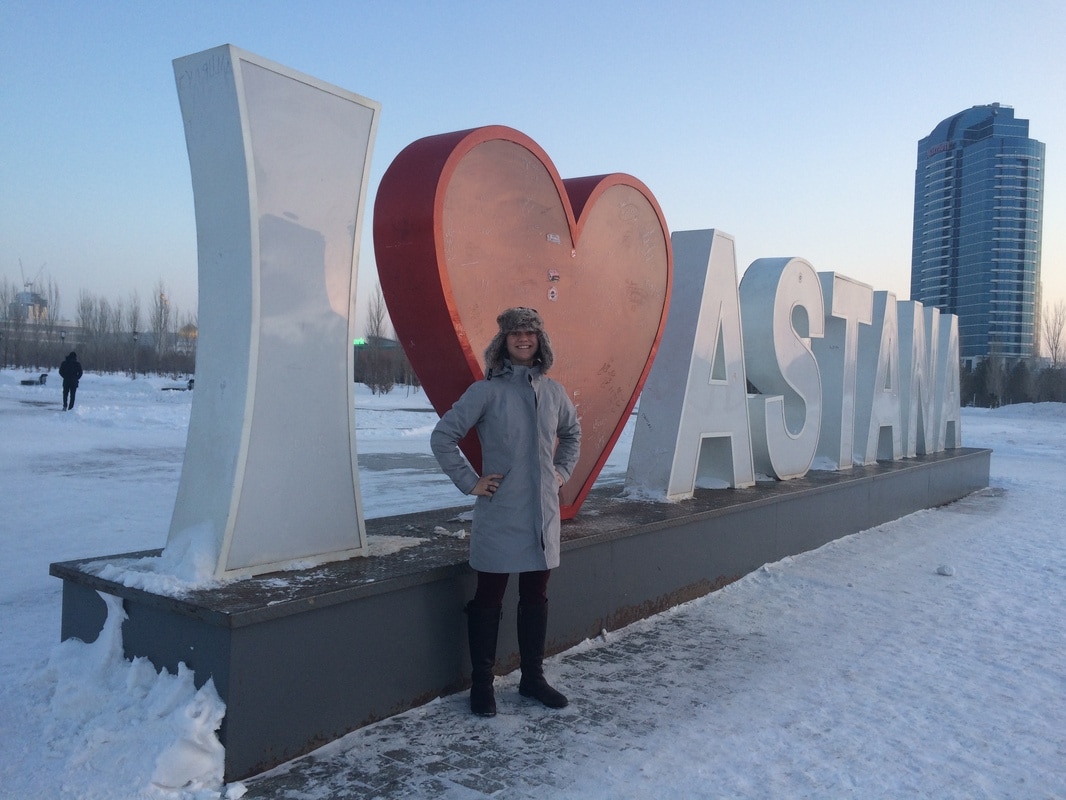- November 16, 2021
Piper Sigrest, Aeronautics and Astronautics ’18, taught a course on the scientific process in engineering through MISTI Global Teaching Labs in Kazakhstan and reaffirmed her passion for her minor in Russian and Eurasian Studies.
TEACHING A CLASS ON ENGINEERING
During January of 2017, Piper spent three weeks in Kazakhstan, the world’s ninth-largest country and one of the most economically advanced in Central Asia, teaching in the National Physics and Mathematics School. First, she spent a week and a half on its campus in Almaty, the country’s largest city, and then in the capital of Kazakhstan, Astana.
The class she developed introduced her students from the 8th and 10th grades to the scientific process and various fields in engineering.
“The school system in Kazakhstan is based heavily in theoretical knowledge, so my goal was to teach the students about practical science in engineering. In other words, how to use the scientific process to design an engineering project or scientific experiment,” Piper explained.
The class held eight sessions, during which students conceived of an idea and planned a project or experiment around their idea. Each day of the class started with warm-up puzzles. The students had several minutes to exercise critical thinking skills with visual logic puzzles. Then, they were given a lecture about a topic in research or engineering. Students had time to conduct individual work specific to their project.
Most days also featured a small classroom demonstration or experiment that taught students different principals in physics, thermodynamics, and aerodynamics. Students completed the class by giving a short presentation about their planned experiment or project.
OVERCOMING THE LANGUAGE BARRIER
In general, Piper didn’t have any problems adapting to the culture and lifestyle of Kazakhstan. However, living and working in this country presented several interesting challenges. The most noticeable was the language barrier: she taught the class in English to non-English speakers.
“In the classroom, I had to adapt my teaching style to ensure that the students understood the lessons. The 10th grade students were more comfortable with English than the 8th graders, but in both classes there was a spectrum of fluency with English,” she remembers.
During lessons, she made sure to speak at a slower pace, use common words, explain uncommon or specialized English terms, and explain concepts in multiple ways. She used PowerPoint presentations with pictures to help convey the material in the lesson, and concepts were reviewed on multiple days in different ways to help the students understand. In addition, Piper gave the students a translated list of important vocabulary, and frequently asked them if they were able to understand her.
“I learned that it’s very important to keep a smile on your face and a positive attitude in order to keep the students engaged and excited. They also loved hands-on activities and experiments that gave them the chance to explore and learn for themselves.”
LEAVING A POSITIVE MARK ON HER STUDENTS
“Throughout the classes, I told my students that they taught me as much as I was teaching them. I learned several things about myself,” Piper admits.
She learned that she truly understand a concept if she’s able to explain it to others. “I had the chance to talk with the students about rocketry and aerodynamics, and preparing those lessons was a great exercise for me to review the material and make sure I was able to explain the concepts in simple terms.”
Moreover, travelling to Kazakhstan also reaffirmed her passion for her minor – Russian and Eurasian Studies. “I loved being able to practice Russian language with native speakers, and even learned some slang words! I also really enjoyed comparing Russian, Kazakh, and American culture,” she said.
Finally, Piper saw the importance of engineering outreach. “On [MIT’s] Rocket Team, we hold outreach activities to get young students interested in rocketry. I saw the same phenomenon in Astana when we held the water bottle rocket launch. I think they have caught “the rocket bug!” I’m so excited that I was able to leave this positive mark on the students and help ignite their interest.”
Throughout the trip, Piper kept a daily blog of her adventures, including pictures. It can be found at kazakhstangtl.weebly.com.

